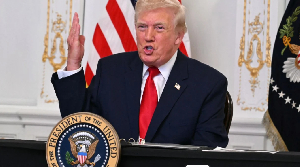By Manasseh Azure Awuni
In 2009 I received an urgent call from the Ghana Institute of Journalism when the school was on a break. I was still a student of the Institute and the call was in connection with an opportunity every student would relish.
There was an opportunity to sponsor one student to spend three weeks in South Africa. And the lot fell on the boy from Bongo. But the information came so late that they needed my passport details immediately to work on my visa. And that is where the trouble came from. I had no passport.
So?
I lost the opportunity to fly. For the first time in my life. I recommended my SRC Vice President and he went and came back to tell me stories. Beautiful stories about Port Elizabeth and Johannesburg. Stories about the enormous exposure he had received and his networking with other journalists and journalism students and trainers from other countries across the continent.
So do I have a passport now? The answer is no. That sounds stupid. I know. I have another opportunity to travel outside the country this year and I’ve started the process of acquiring a passport. The truth is that I‘m not very enthused about living outside this country. That’s me. I know what it means to be a citizen in one’s country and what it also means to be a foreigner in someone else’s land.
I also believe that Ghana has more than enough opportunities for any serious minded person to succeed, damn the difficulties. Besides, this is the only country on earth that I’m entitled to the full protection of the state. This is where I am entitled to all the rights a country has for its citizens.
It is for this reason that I get mad when our corrupt politicians and government officials allow foreigners to abuse us and get away with it. I have never lighted a cigarette in my life but I smoke cigarette and marijuana because our leaders have made that possible.
Last year, I was in a bus when a white man lighted something that was not cigarette and started smoking. We were told it was marijuana. We had to open the windows so that fresh air could enter.
Together with Nyansa Boakwa, the host of Happy FM’s morning show, I confronted the man and told him he had no right to do what he was doing in the bus. And his answer was even more disgusting than his action. He saw nothing wrong with his action. He even had the guts to point out that he was not the only smoker in the bus. We warned him and he didn’t do that again. But we had inhaled, or rather smoked a harmful substance.
Last year when the Ghana Journalists Association organized seminar on investigative journalism for some selected journalists at the Novotel Hotel in Accra, we encountered the same problem. A lot of expatriates sat puffing cigarette smoke in the lobby of the Hotel, and after sometime the smoke hung thick in the atmosphere. You did not need to light a cigar before you could inhale.
This is the fate of many Ghanaians, including babies, who visit public places. In hotels and other important places in the cities, the culprits are mostly foreigners. This is possible because, our politicians, for obvious reasons, will not pass the Tobacco Bill and ban smoking in public places though cigarette smoke is killing many people, including passive smokers who inhale other people’s cigarette smoke.
Since James Bonsack invented the first cigarette rolling machine in 1881 global cigarette consumption has been rising steadily. There has also been a rise in the devastating effects of smoking.
According to the third edition of Tobacco Atlas, all forms of tobacco are addictive and lethal. Scientific evidence also confirms that smokers face a very high risk of death from many cancers, respiratory diseases, stroke and many other fatal infections. Tobacco smoke contains over 4000 chemicals in the form of particles and gases. Out of this number, about sixty of such chemicals cause or are suspected to cause cancer.
According to researchers, about six million people worldwide are dying from tobacco related diseases annually.
Many countries around the world have enacted legislations to curb deaths resulting from smoking but many developing countries, especially those in Africa, are yet to take any meaningful measures to protect their citizens against this deadly trend. A report published by the Global Smoke-Free Partnership and launched in Tanzania in 2009 states that nearly 90% of Africans do not have any protection against second-hand smoking, a phenomenon many countries in the world are vigorously fighting. Second-hand smoking or passive smoking simply means inhaling other people's tobacco smoke.
Research has shown that in countries where there are enforceable ban on smoking in public places, cancers and other heart infections have significantly reduced. A research led by Dr James Lightwood of the University of Califonia found that heart attack rates across Europe and North America dropped by 36% three years after the implementation of anti-smoking laws. Another research also conducted in the United Kingdom revealed that heart attack rates in that country decreased by 10% a year after the ban on smoking in public places in 2007.
Unfortunately in Ghana, all manner of persons, including children, are exposed to tobacco smoke because there are no laws prohibiting people from smoking anywhere they choose.
People smoke in drinking spots, restaurants, hotels, lorry stations, in vehicles and sometimes at work places. If it were possible, they would smoke in churches and mosques.
In fact smokers think it is their constitutional right to smoke and where they choose to do that is no one’s business provided the substance is not illegal. An attempt to challenge such smokers will either result in verbal assaults or a nasty and violent confrontation, in which the smoker usually becomes the victor.
This therefore calls for a national ban on smoking in public smoking. If this is done, it will not only reduce the number of tobacco related infections on second-hand smokers but it will drastically reduce the amount of cigarette consumed in the country. Research has proven wrong the assertion that the demand of tobacco is inelastic and no matter the price increase demand will remain the same.
A study by the American Cancer Society researcher, Evan Blecher, indicates that if the price of cigarette is doubled by tax increment, it can reduce the consumption of the product by 60%. South Africa has been able to cut cigarette consumption by one-third since it started vigorous cigarette tax increment since 1993.
The tourism industries in countries where anti-public smoking laws have been passed have not suffered setbacks so the fear of loss of revenues due to the ban on public smoking is out of the question. Even if there will be consequences, it will at least be better than exposing the citizenry to danger. `
`
Evidence on the benefits of prohibiting public smoking abounds and what is left now is the political will to introduce the ban in Ghana. In African countries like Kenya, Zambia and South Africa where the ban is in place, anti-public smoking laws have had to face very stiff opposition from the tobacco industry. But where there is a will there has always been a way.
The only closest thing to regulation on smoking in Ghana is the Ministry of Health warning: "Cigarette smoking is dangerous to your health.” For now, smokers do not seem to care about that warning and will go ahead to smoke. It is their lives, their right and their health. The question now is: what about those who are forced to inhale cigarette smoke? What option do they have?
The ban on smoking at public places is long overdue and the government must choose between the health of the people and the so-called economic revenue from the tobacco industry. Continues silence, despite pressure from civil society for the passage of the Tobacco Bill, is giving people the reason to believe that the issue of underhand dealings between tobacco companies and policy makers is a reality and not just a perception.
Let parliament and cabinet prove otherwise! I’m tired of smoking cigarette and marijuana, even though I’ve never lighted one. Mr President, rescue me!
Savannah View is a weekly column that appears in the Tuesday edition of The Finder newspaper/Ghana.
Writer’s email:azureachebe2@yahoo.com
Opinions of Wednesday, 7 March 2012
Columnist: Awuni, Manasseh Azure














